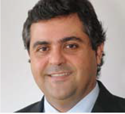The specialism of regulated sectors – Esquível
Lawyers must find innovative ways to ensure that private investors are able to deal with the unexpected issues that may arise from public sector agreements
Private investors appreciate the sustainability, equilibrium and safety of the economic conditions of the public sector in Portugal at the moment, according to José Luis Esquível, Managing Partner of Esquível Advogados. “But sometimes it is not easy to assure them of that when you are signing agreements.”
Despite current economic times, there are still plenty of opportunities for private investment in the public sector, he says. “There are public companies that are providing interesting opportunities, not only for private companies but also foreign public companies. And Portuguese companies operating in regulated sectors that, while have potentially profitable businesses, are facing problems with funding, thereby leaving them open to partnerships, joint ventures or agreements.”
And while these are the two main circumstances prompting investor interest, there is also the Government’s privatisation programme in the wake of budgetary cutbacks.
Obstacles
However, for every investment opportunity, there are numerous issues that arise, namely surrounding how to prosper in a climate where all the risk is on the private sector, says Esquível. “One of the main challenges that private investors face is that the Government is aware that regulated businesses are on the whole better managed by private investors, and it is now taking advantage of this to generate extra revenue.”
In addition to this, the Government’s recent efforts to put all the risk onto the private sector means that some of the risks are difficult to lift as it is beyond the sector’s control. “Added to which,” he says, “despite taking decisions that directly influence the financial part of agreements, the Government is still not prepared to cover such impact”.
And all the while there are ongoing issues that come with an unpredictable market – a continually changing level of demand, behaviour and available funding.
“Today any decision has an impact,” Esquível says, “so if an agreement goes wrong, it is now more difficult to correct than several years ago.”
Risk
For Esquível, a clear need has arisen for law firms to help clients approach risk as though it were a jigsaw puzzle to solve. “At the end of the day, our clients need to know how to manage, accept and react to any kind of situation. As the economic situation on which their agreements are based changes, so do their obligations and they need to follow the times and ensure they continue to comply.”
With years of experience advising on PPPs and other projects, Esquível knows that his clients are now looking for concessions and need to know the risks involved in an agreement that will be in force for five, ten or even 20 years. “These days, they need to know the type of situations that may arise during the life of the contract and their financial impact, especially if they have no option of getting further funding,” he explains. “That’s why we focus on putting mechanisms in the agreements to try to prepare for any eventuality that that may arise during its contractual lifetime.”
Boutique approach
According to Esquível , the one advantage that lawyers in boutique law firm such as his have is that clients know he makes it his business to know this particular area inside out. “The clients come to us for a second opinion as they know we are solely working in a very specialised area, and we can prepare risk matrixes and work out how to can prevent and solve problems that arise in the course of a very specific business sector.”
So while not in the business of creating laws, Esquível still welcomes the possibility of creating new contracts and legal schemes that thoroughly advise on the preparation and execution of agreements.
“We view what we do as legal work that is directly linked to the client’s business, because for us ‘innovation’ comes from starting a conversation with the client and getting to know their business properly so we are in a proper position to identify risk and provide comfort,” he concludes.












